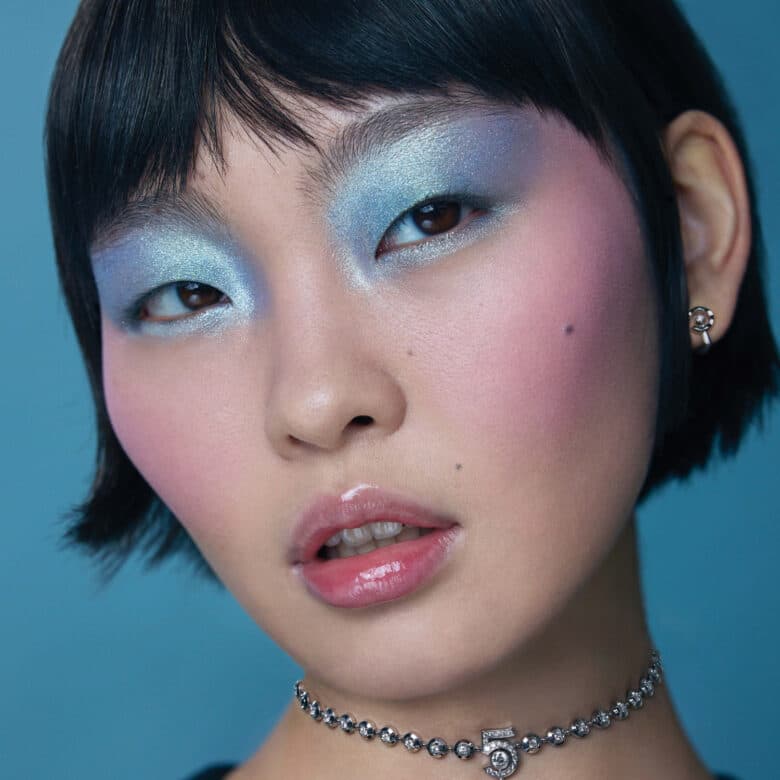The DIY Issue: Paapa Essiedu

You were in the middle of performing in Antoinette Nwandu’s play Pass Over at the Kiln Theatre in Kilburn, north London, when the country went into lockdown. That must have caused quite a shift to your daily life.
It did. To begin with, it was pretty intense, as I’m pretty sure I had COVID-19. So, as soon as the play got shut down, my taste and smell went. This was before that was actually a symptom that people were talking about being related to Corona, so I was just like, “What the fuck is going on?” Then the same thing happened to my girlfriend and all the other members of the cast. So it was probably a public safety must for that show in particular to get shut down.
It was a little COVID-19 bubble.
Yeah, right? At first I was actually quite grateful for a moment to stop and be still. I suppose, as a freelancer, you always have your eye on the unknown. No matter how well or badly you’re doing, you’ve always got to pay attention to something that might or might not be “round the corner”. Even when you’re on holiday and you’re trying to stop, you can’t stop because there’s a kind of low-level anxiety.
About where your next pay cheque’s coming from, you mean?
Well, just the fact that nothing is ever set or promised – it’s not the same as doing a proper job. I was really happy with that moment for about two seconds, and then there were so many explosions and implosions in the world at large that were really difficult to hold, and most of the rest of lockdown was [spent] thinking about ways to look after myself.

London has a strong presence in the recent TV dramas you’ve appeared in – I May Destroy You and Gangs of London. What does the city mean to you?
Oh, London’s my home. I was born in London, raised in London, everything about me is London. I find it really hard to imagine living anywhere else. When I’m away from London for too long, it makes me feel stressed and anxious, and then I get back and get on a horribly packed Tube and suddenly I feel relaxed. There’s something about the community, the culture of London, the modernity, I suppose, of the city that I just vibe with on a fundamental level.
Is the London that we see in I May Destroy You one you recognise?
We filmed all around east London and I’m from Walthamstow. Through the TV and film that is produced in this country, we’re so used to seeing London as a Lock, Stock & Two Smoking Barrels– or The Crown-type world that has a very homogeneous feel. That’s in opposition to the London we see in I May Destroy You, which is also the London that I live in, which my friends are from – you can tell from the way people eat, the way people talk, the way people laugh. That’s the thing about London, it’s so massive and has so many sides to it, no one is more legitimate or valid than the other, it’s just important that we see both.

In 2016, your performance, in the lead role, in Simon Godwin’s Hamlet for the RSC received rave reviews. Was it daunting playing a part that has been interpreted so many times?
Yeah, it was very daunting. For some reason, that part is held in very high esteem historically. When I was about to do it, Benedict Cumberbatch was doing it in London, Michael Sheen had recently done it, David Tennant was the last person to play the role at the RSC, Oscar Isaac was [about to do] it in New York. [The role] attracts blockbuster names but [that comes with] a different kind of pressure. If you are Benedict Cumberbatch, everyone’s looking at you like, “How are you going to do it, Benedict Cumberbatch?” If they don’t know who you are, they don’t have any expectations and you’ve got more freedom to do it how you want. At least at that time I was an unknown entity, so I was really empowered to give an interpretation that was very true to my understanding of the character, in a way that resonated with me.
You’ve played a few other Shakespeare characters. Has the playwright always been a reference for you?
I hated Shakespeare at school. I remember doing Romeo and Juliet and just not being able to understand anything and finding it incredibly boring and opaque. Actually, nah, I remember watching the Baz Luhrmann film and thinking that was cool because it wasn’t like people in ruffs speaking in posh voices, there was a contemporary nature to it. But I didn’t get into [Shakespeare] until I started [performing] it. That’s the thing about Shakespeare, he wrote for actors. They’re plays, not pieces of literature, really, even though you can study them as such. There’s something about physically involving yourself in these plays that takes them to another level, really.

The current pandemic and economic recession have had a huge impact on the arts, and theatre has been particularly badly hit. How do you think the industry has been adapting?
The theatre industry is still in grave danger, especially regional theatres that rely on their pantomime to fund their entire year’s programming. If that pantomime is not happening, the theatres are going to shut down. If those theatres shut down, then the whole ecosystem – which is kind of like a food chain – shuts down. It’s great that there’s been some government funding, but it still needs further protection economically. In terms of how it has adapted, I know there’s a lot more online engagement and sharing of work, which is really interesting and ultimately a good thing, because let’s not pretend the theatre industry was perfect beforehand – it had a lot of serious accessibility issues. Having these online avenues [through] which we can access these pieces is more egalitarian and generally cheaper and more accessible to someone who maybe lives in Durham and doesn’t want to travel to London and back. I’m kind of hopeful for the future of theatre that it will be rebuilt in a way that’s representative of people in all parts of the country, of all different creeds and colours and socioeconomic backgrounds. But it’s going to require a lot of mettle to make sure it happens.
I May Destroy You has been a cult hit. Why do you think it has resonated with so many people?
I think it’s because there’s a relentless truth to it and authenticity. Michaela [Coel] is a really brave woman and hasn’t really got the ability to compromise herself and her ideas. You’re not often given an opportunity through the mechanisms that television works through to keep the purity of an original idea and an original way of executing it. So there was a lot of freedom to the development process and the production period of that show that had an authenticity at the centre of it that people responded to.

The series has sparked a lot of conversations about sex, consent and exploitation and the blurred lines that exist around these subjects. What do you think it has added to that discussion?
It’s hard to answer because there wasn’t a collective understanding of what consent was before the series and there definitely isn’t one after. I think that, in itself, it is an example of how far we collectively need to go in our understanding of it. Sex education in this country is a joke, really, especially in schools. You do a lesson with a biology teacher who points at a diagram of a vagina and says that, if you have sex, a baby will come out of that and ruin your life, basically. If that’s the basis from which we’re working, of course there’s going to be a whole gamut of mistakes we’re making, and they can be preyed upon by predators. It’s about education and it’s about clarity and taking those supposed grey areas and making them way, way smaller. That comes about from conversation, discussion, self-excavation.
The series offers a rare exploration of consent from a gay man’s perspective, through your character, Kwame, who is raped by a man he meets on Grindr. How important was it to show those multiple experiences of consent?
Well, I think the erasure of those kinds of stories is violent. I think the reason we’re so drawn to television, film, theatre and music is because we’re searching for an understanding of our own stories. We’re searching for a reflection of our own lives, and it’s wrong that certain stories are reflected and certain [others] aren’t. It’s deliberate. That’s what I talk about when I talk about authenticity – we need to be that truthful about who we are and tell those stories.

This summer, you appeared in Unsaid Stories, a short-film series inspired by the Black Lives Matter movement, which was commissioned, shot and screened in four weeks. How was it doing a production at such a fast pace?
To be fair, it’s kind of horrible. Nobody has enough time or money or resources to do what you want to do at the level you want to do it. These are stories that are incredibly important, incredibly relevant to the moment and incredibly sensitive. People were feeling huge things about these [subjects] at that precise moment in time, so obviously we wanted more time, money and resources to do it justice. But it was great to be able to work in the structure that we did – which was a team that was [made up of] a Black director, Black writers, Black producers, Black performers – and show people that we have the ability to work under such conditions and still produce elite work.
Our theme for this issue of HUNGER is DIY. What does DIY mean to you in light of the current pandemic and economic crisis? Is there an opportunity to take back control of our own future?
I really was sure you were going to ask me a question about DIY in the house, which I would have been happy to talk about! I’ve always thought that, as freelance artists, there’s a necessity to have an active agency in your own work and practice. I’ve never wanted to just be an actor, I’ve always wanted to create, produce, direct and have greater involvement in work that’s made. We still have a way to go towards [achieving] egalitarianism, if that’s where we’re trying to go. In these times it’s really important to say, “No, this is how I want to work, this is what I’m passionate about, and my story is just as important as that person’s.” That’s exactly how Gangs of London and I May Destroy You got made. As soon as you’re allowing the power and agency of your career and your life to lie in the hands of others – producers, casting directors, agents, whatever – it’s going to depress you and stress you out.
So is now the time for more independently produced TV series and films?
I think it could go either way. As companies are under more pressure, they might double down on being safer and more commercial, which will be disappointing, to say the least. But in a time when there’s more political and social pressure on companies to make a certain type of work, that will hopefully make them take risks and put trust in areas and people that previously they haven’t.
The DIY Issue is out now, get your own copy here.

